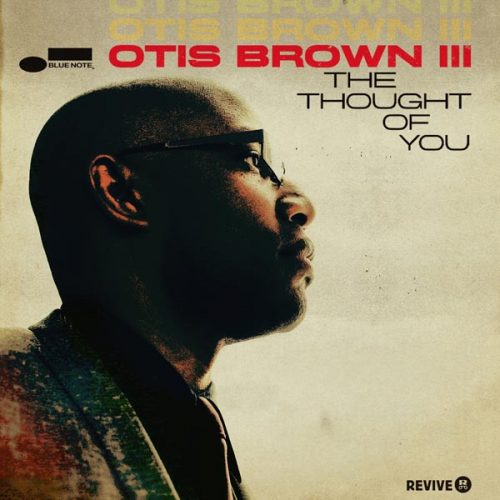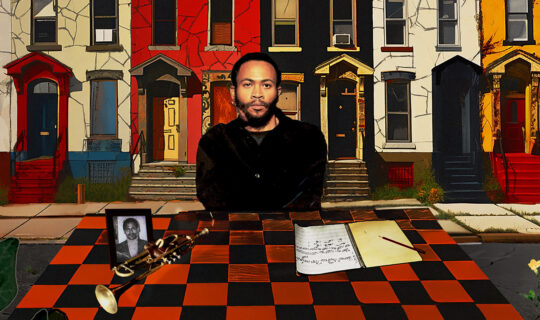September 23, 2014
“Everything on this record is a part of me.”
Drummer Otis Brown III wears his heart on his sleeve, and if you let the musical community that he is an integral part of tell it, the world is better off for it. After fifteen years of sideman work with the likes of Terence Blanchard, Oliver Lake, Eric Lewis, Kurt Elling, Somi, and Gretchen Parlato – and most consistently with Joe Lovano and Esperanza Spalding – Brown steps out with The Thought of You, a bold debut that harks back like a musical memoir through an ingeniously vitalizing lens. Its impressive roll call of featured guests enhances, rather than upstages, the essence of what Brown holds most dear: faith and family.
Pianist Robert Glasper, trumpeter Keyon Harrold, saxophonist John Ellis, and bassist Ben Williams are enlisted as the core band, with organist Shedrick Mitchell and guitarist Nir Felder making special appearances. Singers Bilal, Gretchen Parlato, and Nikki Ross contribute particularly affecting standout performances that underscore the sentiments of the album’s co-producer, Derrick Hodge, who says, “Otis has become one of those drummers who once you hear him play, his experience becomes your experience in the moment.”
There are no coincidences in the casting. Brown’s “family first” philosophy shines through right out of the gate with “The Way (Truth & Life),” co-written with Glasper. The highly energetic and lyrical piece features the album’s core quintet which, with the exception of Williams, re-assembles their college jazz ensemble from their days at The New School for Jazz and Contemporary Music in New York City. “The most special thing about working with Otis is simply the joy he gets out of playing music; it’s all over his face like a little kid,” says Glasper. “People have lost that joy and take playing too seriously.” This point is well illustrated on “The Thought of You”; a jam session-like trilogy weaved throughout the album. “Part I” opens with a signature vamp from Glasper, with Brown providing a knocking backbeat before the group breaks into a glorious swing. Bilal, a vocalist of astonishing versatility who also composed the tune, offers a glimpse at his bona fide jazz chops, with Harrold’s burning solo following up the velvety vocals.
Floating atop “Interlude I – The Truth,” which grooves on a variation of the opening number, is a declaration: “You can have your truth; I can have my truth.” Brown attests that the interpretations of the statement are endless, but also applies it as a message to anyone who is bent on drawing hard lines when it comes to genre identification or harshly judging artists who push beyond manufactured margins. There isn’t a more relevant group of musicians to make such a proposition; nearly everyone on the album has made significant departures from the music that initially drew them together. Glasper and his group Robert Glasper Experiment, which includes Hodge, skyrocketed as a breakout GRAMMY-winning, genre-defying band; Harrold has been playing consistently with the likes of Jay-Z and R&B crooner Maxwell; and Bilal became a star in his own right as a founder of the neo-soul movement.
Yet there is a “don’t get it twisted” undertone in their performances of the more straight-ahead material, and moreover, an evident, overflowing love exuded for the music they have never abandoned. “Stages of Thought” further engrains that outlook with a moody, highly improvisatory number that grooves over a vamp in 11/8 meter, with a swelling intensity. We hear the first ballad of the album with “The Two Become One” which is a dedication to Brown’s wife, Paula. Williams plays a poignant introduction before the group (which features the alluring addition of Ellis’ bass clarinet) joins with an almost meditative feel.
Parlato oozes the opening lyric, “Looks like we made it”, on “You’re Still The One,” a tribute to the Browns’ now fourteen year marriage. The 90s hit from country-pop superstar Shania Twain, which comes across like a refrain of the heart, gets a gorgeous makeover via an arrangement from Glasper and a resonant vocal performance from Parlato. The pair has proven to have an uncanny predilection for reimagining pop material. “This version is in the same vein as other pop covers Robert and I have collaborated on,” says Parlato, “in that his vision for re-arrangement and reharmonization completely transforms the listener from the original version, giving it new life and meaning, while still honoring what makes the song a classic.”
“The Thought of You – Part II” fades up with a picturesque solo from Ellis, who Brown says has, “a singular thing that nobody else has; he has a tone and sound and way he plays lines,” concluding, “he’s one of my favorites of my contemporaries by far.” The album takes a sharp, yet aesthetically viable turn with a stunning performance of gospel medley “I Love You Lord/We Exalt Thee/In The Beginning.” Best known for her association with gospel luminary Kirk Franklin, masterful vocalist and keyboardist Nikki Ross has cultivated a loyal following of her solo work. The medley opens with a stripped-down performance of “I Love You Lord”, with Ross and Mitchell, who is well known as one of the most harmonically inventive organists on the gospel scene. The tear jerking performance blends seamlessly into “We Exalt Thee” with Brown’s mallets taking the song to stratospheric heights. Williams and Glasper add splendid layers to a beautiful vamp, “In The Beginning,” composed by Mitchell, which includes interweaving, floating harmonies from Ross. “The Thought of You – Part III” features Glasper, and Bilal reemerges to bookend the triplex statement. Ross appears once more on “I Am Your Song,” which has become a modern classic in the gospel realm. Arranged by Hodge, the song serves as a benediction of sorts, with a dynamic solo from Brown. The album closes with, “Interlude II – Life,” a driving vamp with Brown’s drums gritty and emotional, with a synthesizing solo of hip hop, jazz, rock.
“Sometimes a producer can be so focused on trying to prove versatility and sonic range, that the artist suffers because it becomes about proving a point more than it is about focusing solely on what the artist has to say,” says Hodge. Far from a jazz-meets-gospel record, or jazz-meets-90s pop effort, The Thought of You is a sum of all of the parts of Brown, with its versatility serving merely as a truth, rather than a tool.
* * *
The son of musicians and music educators, New Jersey native Otis Brown III grew up to the sounds of jazz, gospel, funk and rhythm and blues. His father, a jazz band instructor, played with James Brown and Al Green. His mother, an educator who also served as principal at Newark’s Arts High School (alma mater to jazz greats Sarah Vaughan and Wayne Shorter), was also a choir director and classically trained pianist. One could surmise that Brown had no choice in the matter when it came to his profession, yet he felt no pressure by his musically-immersed childhood. “I think they understood that it has to, in a way, choose you; you can’t really force it on somebody,” says Brown of a career in music. “My parents were great about that.”
After playing saxophone and drums in school and church, and attending Delaware State University as music major, Brown crossed paths with jazz icon Donald Byrd and his course was dramatically altered. Byrd, who was Artist in Residence at DSU, convinced Brown to think beyond a career in music education and go to New York City to be in the thick of things. “It was life changing,” says Brown, who after studying at The New School for Jazz and Contemporary Music and the Thelonious Monk Institute, caught the attention of Joe Lovano. Initially subbing for Lewis Nash and Idris Muhammad in Lovano’s bands, Brown became a founding member of Lovano’s Us Five quintet, recording three albums, including the GRAMMY-nominated Bird Songs. “We’ve had a beautiful communication and the concentration is there but it’s not stiff; it’s very free and open, so we can contribute together in the music,” says Lovano. “There’s a lot of trust that has to happen when you play with people over a length of time like that, and it’s a natural thing, and that’s been happening with Otis all these years, it’s beautiful.”
Esperanza Spalding holds Us Five’s bass chair, and the musical camaraderie shared with Brown resulted in his joining her band and recording on her debut album. “He always gave and gives one hundred and ten percent of himself musically on the bandstand,” says Spalding, which is a sentiment inspired by most every musician who encounters Brown. “You always get the feeling playing with him, about the humility in his spirit and his willingness to do whatever it takes to take the music to its highest level,” says Ben Williams, who worked with Otis as the rhythm section of pianist Gerald Clayton’s trio. That humility is rooted in Brown’s faith which is his personal and professional foundation. “It’s critically important for me; it’s the reason I play,” says Brown. “Without sounding contrived, I think it’s super important for how we try to raise our children, and just for every aspect of life, and music is one of those aspects and avenues for me. Without it, it would be pointless to me. It’s the reason for everything I do.”
The Thought Of You is available now via Revive/Blue Note. Find the album on iTunes (smarturl.it/OB3-itunes) or Amazon (smarturl.it/OB3-amazon).







